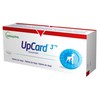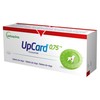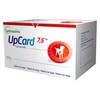UpCard
UpCard Tablets are an innovative treatment for congestive heart failure in dogs. They contain the active ingredient Torasemide, which is a loop-diuretic to treat fluid overload due to heart failure, kidney failure, liver disease and high blood pressure.
UpCard Tablets are presented as oblong white to off-white tablets with visible break lines to divide them equally for accurate dosing.
UpCard 3mg Tablets for Dogs
£0.91UpCard 3mg Tablets are indicated for the treatment of clinical signs, including oedema and effusion, related to congestive heart failure. UpCard Tablets are a once-daily treatment, and have...[More info]
UpCard 0.75mg Tablets for Dogs
£0.53UpCard 0.75mg Tablets are indicated for the treatment of clinical signs, including oedema and effusion, related to congestive heart failure. UpCard Tablets are a once-daily treatment, and...[More info]
UpCard 7.5mg Tablets for Dogs
£1.64UpCard 7.5mg Tablets are indicated for the treatment of clinical signs, including oedema and effusion, related to congestive heart failure. UpCard Tablets are a once-daily treatment, and...[More info]
Dosage and administration
Oral use.
UpCard tablets can be administered with or without food.
The recommended dose of torasemide is 0.1 to 0.6 mg per kg bodyweight, once daily. The majority of dogs are stabilised at a dose of torasemide less than or equal to 0.3 mg per kg bodyweight, once daily. The dosage should be titrated to maintain patient comfort with attention to renal function and electrolytes status. If the level of diuresis requires alteration, the dose may be increased or decreased within the recommended dose range by increments of 0.1 mg/kg bodyweight. Once signs of congestive heart failure have been controlled and the patient is stable, if long term diuretic therapy with this product is required it should be continued at the lowest effective dose.
Frequent re-examinations of the dog will enhance the establishment of an appropriate diuretic dose.
The daily schedule of administration can be timed to control the period of micturition according to need.
Contra-indications, warnings, etc
Do not use in case of renal failure.
Do not use in case of severe dehydration, hypovolaemia or hypotension.
Do not use concomitantly with other loop diuretics.
Do not use in case of hypersensitivity to the active substance or to any of the excipients.
Special precautions for use in animals
In dogs presenting in acute crisis with pulmonary oedema, pleural effusion and/or ascites requiring emergency treatment, the use of injectable drugs should be considered first before commencing oral diuretic therapy.
Renal function, hydration status and serum electrolytes status should be monitored:
- At treatment initiation
- from 24 hours to 48 hours after treatment initiation
- from 24 hours to 48 hours after dose change
- In case of adverse events.
While the animal is on treatment, these parameters should be monitored at very regular intervals according to the benefit-risk assessment performed by the responsible veterinarian.
Torasemide should be used with caution in cases of diabetes mellitus, and in dogs with previously prescribed high doses of an alternative loop diuretic. In dogs with pre-existing electrolyte and/or water imbalance, this should be corrected prior to treatment with torasemide.
Torasemide treatment should not be initiated in dogs already clinically stable on an alternative diuretic for treatment of the signs of congestive heart failure, except where this has been justified taking into account the risk of de-stabilising the clinical condition and of adverse reactions as indicated below.
Operator warnings
People with known hypersensitivity to torasemide or other sulphonamides should administer the veterinary medicinal product with caution.
This product may cause increased urination and/or gastrointestinal disturbances if ingested.
Keep tablets in the blister packs until required, and keep the blisters in the outer carton.
In case of accidental ingestion, particularly in the case of children, seek medical advice immediately and show the package leaflet or the label to the physician.
Adverse reactions (frequency and seriousness)
Increase in renal blood parameters and renal insufficiency are very commonly observed during treatment.
As a result of the diuretic action of torasemide, haemoconcentration and, very commonly, polyuria and/or polydipsia are observed.
In cases of prolonged treatment, electrolyte deficiency (including hypokalaemia, hypochloraemia, hypomagnesaemia) and dehydration may occur.
Gastrointestinal signs which include emesis, reduced or absent faeces and, in rare cases, soft faeces may be observed. Occurrence of soft faeces is transient, mild, and does not necessitate the withdrawal of the treatment.
Erythema of the inner pinnae may be observed.
The frequency of adverse reactions is defined using the following convention:
- very common (more than 1 in 10 animals displaying adverse reaction(s) during the course of one treatment)
- common (more than 1 but less than 10 animals in 100 animals)
- uncommon (more than 1 but less than 10 animals in 1,000 animals)
- rare (more than 1 but less than 10 animals in 10,000 animals)
- very rare (less than 1 animal in 10,000 animals, including isolated reports).
Use during pregnancy, lactation or lay
The safety of the veterinary medicinal product has not been established during pregnancy or lactation. The use of UpCard is not recommended during pregnancy, lactation and in breeding animals.
Interaction with other medicinal products and other forms of interaction
Co-administration of loop diuretics and NSAIDs can result in a decreased natriuretic response.
Concomitant use with veterinary medicinal products affecting electrolyte balance (corticosteroids, amphotericin B, cardiac glycosides, other diuretics) requires careful monitoring.
Concurrent use of drugs that increase the risk of renal injury or renal insufficiency should be avoided.
Concomitant use with aminoglycosides or cephalosporins may increase the risk of nephrotoxicity and ototoxicity.
Torasemide may increase the risk of sulphonamide allergy.
Torasemide can reduce the renal excretion of salicylates, leading to an increased risk of toxicity.
Care should be exercised when administering torasemide with other highly plasma protein bound drugs. Since protein binding facilitates the renal secretion of torasemide, a decrease in binding due to displacement by another drug may be a cause of diuretic resistance.
Concomitant administration of torasemide with other drugs metabolised by cytochrome P450 families 3A4 (e.g.: enalapril, buprenorphine, doxycycline, cyclosporine) and 2E1 (isoflurane, sevoflurane, theophylline) may decrease their clearance from the systemic circulation.
The effect of antihypertensive drugs, especially angiotensin converting enzyme (ACE)-inhibitors, may be potentiated when co-administered with torasemide.
When used in combination with cardiac treatments (e.g. ACE-inhibitors, digoxin), the dose regimen may need to be modified depending upon the animal's response to therapy.
Adverse reactions (frequency and seriousness)
Doses greater than 0.8 mg/kg/day have not been evaluated in the target animal safety or controlled clinical studies. However, it is anticipated that overdose increases the risk of dehydration, electrolyte imbalance, renal insufficiency, anorexia, weight loss and cardiovascular collapse.
Treatment should be symptomatic.


